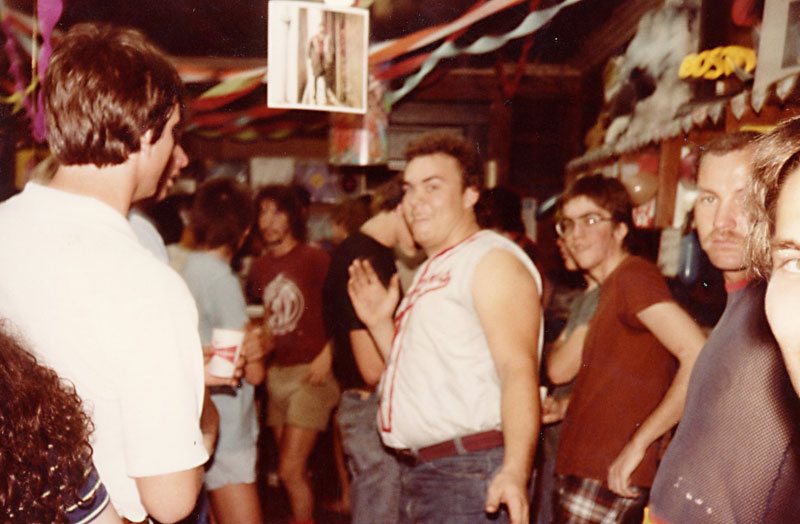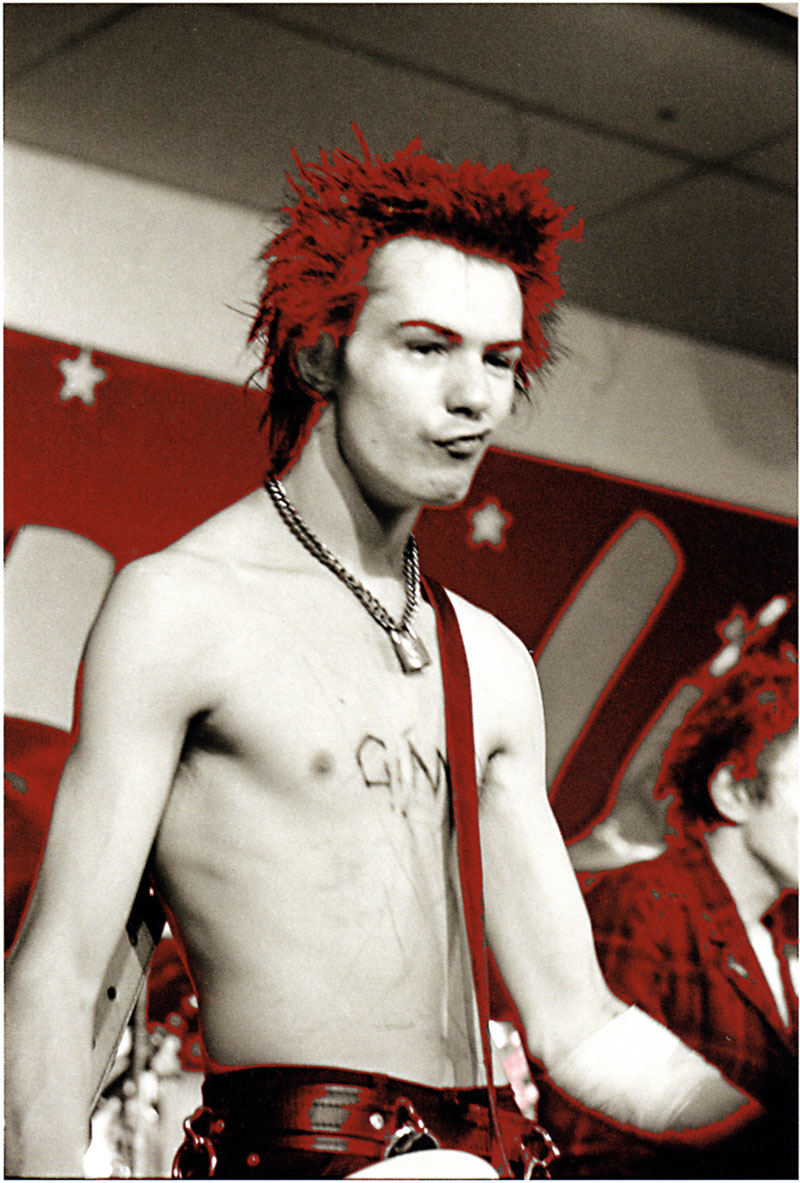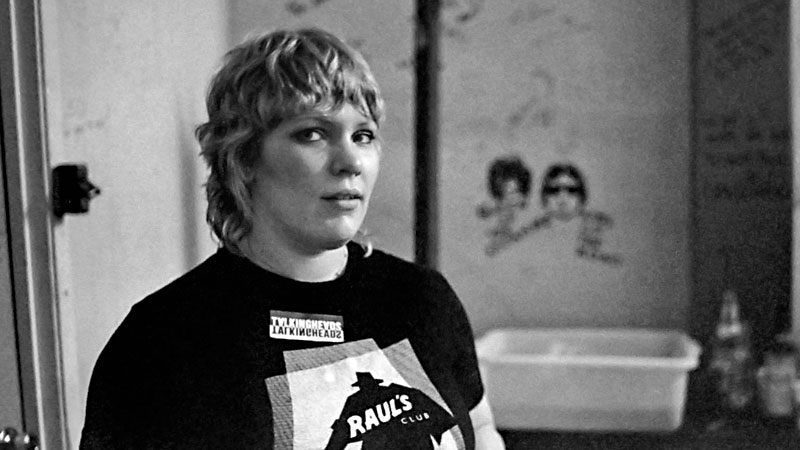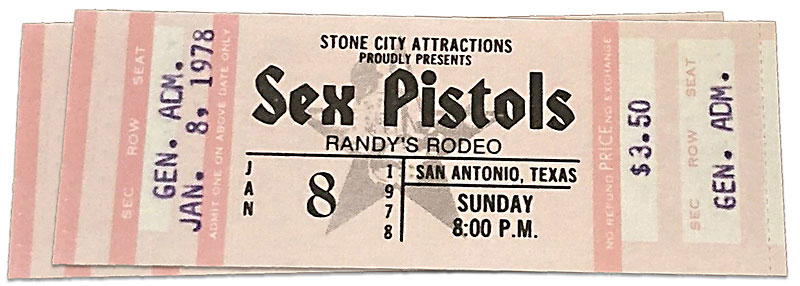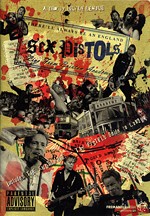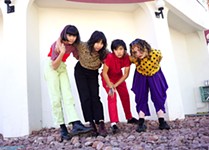Austin Punk Chronicles: "I Don't Think the Sex Pistols Inspired Anything Other Than a Buncha More Punk Bands!"
The San Antonio shootout ricochets locally in Chapter 4
By Tim Stegall, Fri., Dec. 31, 2021
Editor’s note: This is Chapter 4, Part I, in a serialized history of Austin’s punk culture, written by veteran journalist Tim Stegall. The first three chapters delved into seminal expressions of the DIY music scene: a primordial collaboration between Roky Erickson and Doug Sahm, glam rock, and Austin’s first punk bands. Now, the influence of UK ambassadors the Sex Pistols takes hold locally. This chapter’s second half, recounting the notorious Randy’s Rodeo concert, runs next week – coinciding with the event’s January 8 anniversary.
"Rock & roll is supposed to be fun. You're supposed to enjoy it. It's not about taking a million fucking years to learn a million fucking chords on the guitar."
– Johnny Rotten, 1977
Stop Your Cheap Comment, 'Cause We Know We're for Real
London's Sex Pistols began in 1975 with two teenage New York Dolls-lovers, guitarist Steve Jones and drummer Paul Cook. Haberdasher Malcolm McLaren, who'd failed at saving the Dolls from their inevitable flame-out as glam crashed and burned, eyeballed them as an excuse to sell his deviationist King's Road boutique Sex's pornographic T-shirts and introduced them to his Saturday shop assistant, Glen Matlock. They, in turn, introduced Matlock to the collection of instruments they'd pilfered from heroes like David Bowie and Ronnie Wood. An accomplished bassist fond of Sixties mod-pop – Small Faces, early Who – Matlock became the Pistols' tunesmith. They dumped him one month after the release of debut single "Anarchy in the U.K." His replacement? Charismatic non-bassist Sid Vicious.
McLaren never bargained on John Lydon, the anti-singer discovered by his art school chum, future Clash manager Bernie Rhodes. Lydon's proto-Dr. Gregory House demeanor, ripped-and-torn "I HATE PINK FLOYD" T-shirt, spiky vomit-orange hair, and green teeth inspired Jones to rename him "Johnny Rotten." His caustic wit ("Tell us – wot's it like to have bad taste?"), a talent for writing insurrectionist lyrics, and battery acid vocal style ensured the Pistols would never be the Bay City Rollers. That was McLaren's dream.
Lydon proved a lifelong contrarian. To this day, he denies punk emerged from a load of disaffected Dolls and Stooges fans worldwide.
"I know they've been referenced," muses the now-65-year-old Lydon. "But that wasn't really my experience. My taste is vast and expansive. And I know Glen's would be from the British music scene from the Sixties. We're very different people, and we've all heard those records, yes. But we never deliberately sat down with them to be a part of that."
Hmmm ... is this why Jones claims speed-fueled sessions with Iggy & the Stooges' Raw Power "until my fingers fucking bled" were his crash-course guitar lessons? On a Les Paul once belonging to the Dolls' Syl Sylvain, brought to him by McLaren?
"It's desperate to look for a scene and categorize it," dismisses Lydon. "The only scene is that we were ob-scene. That's the way it is, and here I am – the outsider from the shit-stem, striving for individuality with a do-it-yourself attitude. I am the true essence of an individual, which I think is more important than the term 'punk.'"
This is naturally the once-and-future Johnny Rotten's perspective. True rebels refuse categorization – they don't want to be figured out. McLaren could never control him nor the Pistols. As they acted like the hooligans they were, they became notorious. Their constant negative press inspired teens across Britain to spike their hair and shred their school uniforms, reconstructing them with safety pins: "I can do this, too!" McLaren quickly realized the advantages.
The (mis-)manager presented himself as Fagan and the band as Artful Dodgers. They swore on television and burned through record companies like a sailor with a pocketful of cash. They inspired England's initial punk bands: the Clash, the Damned, Buzzcocks, Generation X, Siouxsie & the Banshees, the Slits, the Adverts, X-Ray Spex. Their records, helmed by Roxy Music producer Chris Thomas, were well-recorded, explosive rock & roll. But the X-factor saving the Pistols from merely being louder Chuck Berry was Rotten, hurling out ringing phrases ripped straight from a social outcast's diary: "When there's no future, how can there be sin?" he questioned in "God Save the Queen." "We're the flowers in the dustbin/ We're the poison in your human machine/ We're the future – your future!" For his trouble, Rotten got stabbed on the streets. For theirs, the band was barred from most UK venues.
The Pistols invented themselves, grabbing the world's attention by being everything pop stars shouldn't: oppositional, disagreeable, ugly, abrasive. Their message even cut through the steel guitars still crying at the Armadillo.
"I pretty much hated the music scene," says Dan Puckett, then a 22-year-old UT student from San Antonio, studying Russian since 1974. "It just seemed really old-fashioned. The only time I'd see live music was at the Armadillo, or cover bands at bars. Most of the music I listened to was prog rock – Roxy Music and Pink Floyd. I had guitar lessons in junior high, but I hated playing the guitar.
"I started noticing some people around town liking music coming out of Britain in late '77. I lived at the ARC Co-Op, and I bought one of the first copies of 'Anarchy in the U.K.' at Zebra Records on Lavaca. One day I was pulling into the parking lot of the ARC, and I heard 'Anarchy in the U.K.' coming out of a room. So I counted the windows and raced upstairs and knocked on the door."
Phil Tolstead, another San Antonian radio/TV/film major, answered. The duo spent the next three hours talking about music. The seeds for early Austin punk band the Huns were planted that day.
Meantime, teenage skateboarder Chris Gates, eventually of the Big Boys, found a record bag outside Dobie Mall containing the Ramones' third LP, Rocket to Russia, and the just-released Never Mind the Bollocks, Here's the Sex Pistols.
"I took 'em home and I played 'em, and I liked the Ramones record. I'd seen them by that point, and I liked the record. It made some sense to me now. But the Sex Pistols record was so off-putting. It was so abrasive, so unmusical at the time, that I really disliked it. It irritated me. But I couldn't stop playing it. I kept pulling it out and playing it. It was like candy that was too sour, but you couldn't stop eating it. 'Ohmigod, this is awful!' Then I'd take another bite.
"Over time, it grew on me. It began to make more sense."
We're the Future – YOUR Future!
Bollocks hit American retail via Warner Bros. Records on Nov. 11, 1977, two weeks after its UK release on Virgin. Freelance graphic artist Ronn Spencer reconfigured Pistols in-house designer Jamie Reid's yellow/red sleeve into a lurid pink/green monstrosity. Some complained about every 45 A-side's inclusion – "Anarchy in the U.K.," "God Save the Queen," "Pretty Vacant." One of punk's unspoken tenets was value-for-dollar: 45s and LPs should feature material exclusive to each format. Truth be told, the album's 12 tracks were every original the band had written since their 1975 formation, give or take a B-side or two. But it made for a fabulous repertoire.
Jones made, in critic Greil Marcus' estimation, "a sound that was more like that of a man playing a guitar factory than a guitar," doubling on root note bass for the instrumentally challenged Vicious. Cook slammed his drums as steadily as Charlie Watts, and as heavily as John Bonham, never allowing his bandmates to rev up to the already cliched 250 mph punk tempo. The Pistols were solidly mid-tempo. Up front: Rotten, focusing the rage of a generation being told they were worthless, furious at the bloated spectacle of Seventies rock – hell, of Seventies society. Bile flew from his lips, coating the listener. Some were thrilled. Many were repulsed.
Some at Warner – in the year they minted gold faster than they could bank it with Fleetwood Mac's Rumours, essentially the anti-Bollocks – couldn't understand their signing.
"My own feelings were, 'We have the Ramones! Can't we just go forward with them?'" recalls Bob Merlis, then Warner's director of publicity. "It seemed, at a great distance, that this was some kind of a hustle. It wasn't. But I was thinking, 'Why are we latching onto this English bandwagon, when we in essence had started it? Let's just nurture the thing we have here. Why do we have to shop for headlines?'
"But the reality was they knew how to make headlines and the Ramones didn't. I guess it was because they came from a small country – you drop a pebble in a lake, and you create a tidal wave. It did translate in America in terms of creating excitement, but not the controversy they had over there. You have a band called the Sex Pistols, and they are perceived as anti-society? That fits your hat to a certain rock & roll tradition.
"But the band was good, Sid's inability to play notwithstanding. They were good at what they set out to do. That's a great record."
Bob Regehr, Warner's vice president of artist development and publicity, saved the day. An old-school record man who prioritized music over money while giving the bean counters enough hits to satiate their thirst, he saw the Pistols signing's value. He firmly placed a large promo budget toward breaking them stateside. Warner already rebranded punk as "New Wave" to ameliorate delicate American sensibilities. Director of Artist Development Ted Cohen spent seven years at the label shepherding Alice Cooper and Leo Sayer on tour when Regehr brought him the label's prime punk acts.
"The way I explained my job to people," chuckles Cohen, "is in the case of David Lee Roth, I'd tell him, 'You're talking too much. And stop looking at the girls' tits.' And in the case of [Talking Heads'] David Byrne, I'd tell him, 'Please say something! And stop looking at your shoes!'" For his troubles, Cohen became the real-life model for the fictional dorky label rep on the tour bus in Alex Cox's film Sid and Nancy, trying to sell Rotten on his song with "a kinda punky feel": "I want a job/ I want a job/ I want a good job ... One that satisfies my artistic needs!"
After working the Ramones, Dead Boys, and Talking Heads, Cohen got the Pistols. He needed to excite radio, retail, and local Warner reps about a band refusing to play the game.
"We are currently attempting to firmly establish Punk/New Wave music as a viable and saleable commodity," he urged Dallas-area WEA reps Bob Finer and Paul Sheffield in a letter dated Dec. 30, 1977. "The Sex Pistols are the 'ground breakers' of a new musical 'turf'. In England they have a following that has manifested itself in both a musical and social lifestyle. They are controversial, they are raw, and they elicit a response from audiences not seen since the early days of the Rolling Stones." He concluded, "The Pistols can and will be a major act for Warner Bros., but not without your cooperation and support."
Now Warner and Premier Talent, the Sixties inventors of the Major Rock Tour, needed the Pistols' cooperation and support. They planned a large-scale U.S. tour to break them stateside. Noel Monk, ex-Fillmore East stage manager and road manager for everyone from the Stones to Johnny Cash, was contracted to handle this difficult act. No one bargained on their manager being even worse.
According to 12 Days on the Road, Monk's inside account of the Pistols' U.S. invasion, McLaren did everything possible to thwart the label and booking agency. His demands via his U.S. representative Rory Johnston grew flakier by the minute.
"Malcolm McLaren wanted the Pistols to play in cowboy joints," says Vamps keyboardist Joe Pugliese, then working for major Texas concert promoters Stone City Attractions. "He wanted to create some kinda conflict."
"It was a very weird thing for the Sex Pistols to be playing to cowboy hats and fringed vests," snickers Lydon. "And why not? They made room for us, so I'll always make room for them."
Eventually, an itinerary was sketched from December 30 through January 3: a handful of Northern dates accompanied by Cleveland art-punks Pere Ubu, Southern gigs following, culminating in San Francisco. Tickets would be affordable – $3.50. The Pistols would also make their American TV debut on NBC's NYC-based late-night comedy show Saturday Night Live.
Stone City booked the Texas dates. Begun in 1972 by Jack Orbin, Greg Wilson, and Carl Schwartz, it expanded across six years from promoting San Antonio concerts to working shows in 16 markets in three states. Pugliese was their first employee, showing his bosses how to prevent people from sneaking into gigs, based on experience.
"They asked me if they should book the Sex Pistols," says Pugliese. "I said, 'Hell yeah, you should book 'em!' They didn't know anything about 'em. They weren't really into punk too much."
Orbin booked Dallas' Longhorn Ballroom two nights after S.A., local punks the Nervebreakers opening. A country & western venue, its marquee famously advertised, "Tonite Sex Pistols / Jan. 19 Merle Haggard." Randy's Rodeo on Bandera Highway, close to the Pugliese residence, hosted the San Antonio show. The purpose-built Bandera Bowling Lanes in the Fifties, warping foundations built on unstable caliche-infused soil led to Randy Sherwood purchasing the property in the late Sixties, turning it into a honky-tonk.
"In the Seventies, it just became a rental venue," says Pugliese. "When we told Malcolm about Randy's Rodeo, he loved the idea. He didn't realize that it was just a venue that Rush played at, the Runaways played there."
"We were desperate to play," says Lydon. "We would play anywhere, and we were warned it would be a very dangerous place to play. And so we played it! Nothing but positive results came from that."
For opening acts: Pugliese's Stooges/Dolls-drenched Vamps and a sci-fi heavy metal band called Ultra. Now the Pistols just had to show up.
They nearly didn't. Dec. 30, the U.S. State Department refused the Pistols' entry, turning them away at Heathrow Airport – all four had police records. Warner's attorneys got to work with the State Department, but the Northern dates and SNL were finished. Elvis Costello & the Attractions deputized on SNL after the Ramones refused. Costello received a 12-year ban for launching into the unreleased "Radio, Radio," rather than his current single. Drummer Pete Thomas cheekily wore a "Thanks Malc" T-shirt.
Days later, a phone rang at the Texas Employment Commission's Downtown Austin offices. Margaret Moser, an Austin Sun rock journalist, excitedly called her boyfriend Ken Hoge, a recent UT RTF graduate who moonlighted as a photographer for the alternative periodical. He just started working a clerk III job, "the lowest [position] you could get."
"THE SEX PISTOLS ARE GONNA BE IN SAN ANTONIO!" she screamed.
"No way!" he scoffed.
"WAY! THEY'RE SELLING TICKETS AT JOSKE'S! GO DOWN THERE AT LUNCH AND BUY US TICKETS!"
So Hoge dutifully headed to the third-floor ticket booth at the once-prominent Texas department store's Highland Mall location, paying $7 for a pair of passes.
"The irony of buying tickets for the most fuck-you band ever at a suburban mall was too rich," remembered Moser in her Jan. 10, 2003, Austin Chronicle account of the event ("Holiday in San Antonio," Music).
"We had the Sex Pistols album, and we played the hell out of it," says Hoge. "We were regulars at Inner Sanctum Records. So, yeah. We were really primed for it."
Want more of the “Austin Punk Chronicles”? Stay tuned for more, and find previous chapters at austinchronicle.com/austin-punk-chronicles.






